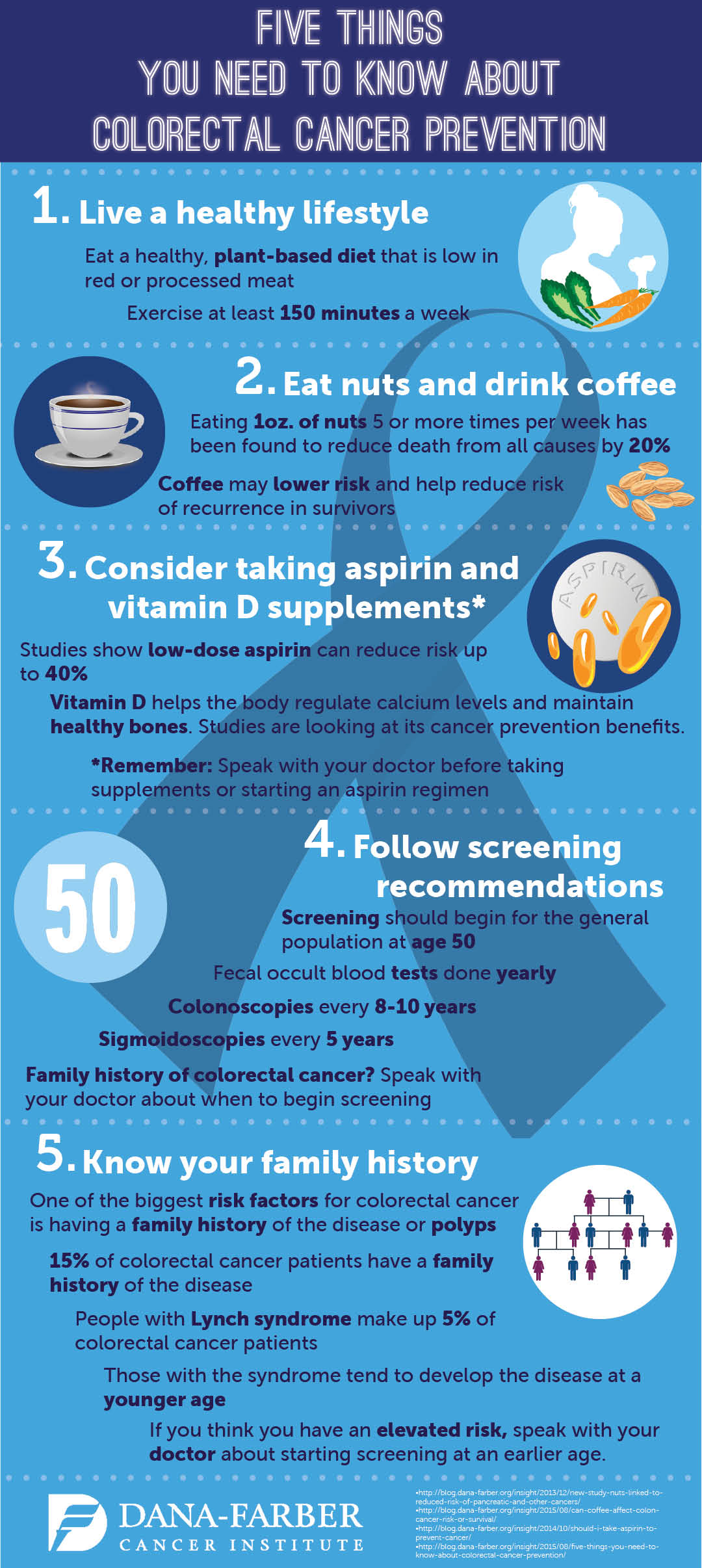Updated April 13, 2015
While one of the most common cancers in both men and women, colorectal cancer remains a very preventable disease, says Jeffrey Meyerhardt, MD, MPH, clinical director of Dana-Farber’s Center for Gastrointestinal Oncology.

“Most of these cancers develop over a period of years,” he says. “While not preventable in everyone, the earlier you detect the disease, the more curable it is.”
Here are some tips from Meyerhardt on ways to reduce your risk.
Live a healthy lifestyle.
“There are various dietary factors that play a role in colorectal cancer,” explains Meyerhardt. “The one that’s the most consistently shown in studies is red and processed meat.” To lower your risk, Meyerhardt recommends eating fewer than two servings of red or processed meat per week. This includes foods such as steak, hamburgers, and hot dogs.
Other lifestyle factors that increase the risk of colorectal cancer are obesity and physical inactivity, as these increase insulin levels that may help drive cancer cell growth. Ideally you should exercise at least 150 minutes per week, but any amount is better than being inactive, Meyerhardt says. Following this guideline can help you maintain good health and decrease your risk of colorectal cancer and many other diseases. Multiple studies conducted at the Dana-Farber have shown consistent associations between increased physical activity and lower risk of recurrence in colorectal cancer survivors.
Eat enough nuts and drink coffee.
Nuts – of any kind – have been shown to have a positive effect on decreasing risk for pancreatic cancer and other diseases, including colorectal cancer. Nuts have been found to reduce rates of insulin resistance, which can increase the risk of colorectal cancer. Eating one ounce of nuts five or more times per week has been found to reduce death from all causes by 20 percent.
Coffee consumption has also been linked to a lower colorectal cancer risk, including for recurrent disease in survivors, as it seems to be associated with insulin-resistance pathways, says Meyerhardt.
Consider taking aspirin and vitamin D supplements.
While many people take aspirin for cardiovascular disease, the drug also seems to have a risk-reducing correlation with colorectal cancer. In April 2016, the U.S. Preventive Services Task Force issued a statement recommending adults age 50-59 use low-dose aspirin for the prevention of colorectal cancer. The Task Force statement also said adults age 60-69 should decide with their primary care clinician if aspirin use for colorectal cancer prevention is right for them.
This is an area of ongoing research, Meyerhardt cautions, and there are risks to aspirin intake, notably the possibility of ulcers and upper gastrointestinal bleeding, so be sure to weigh the risks and benefits with your physician.
Read more:
Vitamin D helps the body regulate calcium levels and maintain healthy bones. The risk-reduction benefits of this supplement for cancer, heart disease, and stroke are currently being evaluated through the VITAL Study at Brigham and Women’s Hospital. Like aspirin, Meyerhardt recommends speaking with your physician before taking any supplement.
Follow screening recommendations.
“Colorectal cancer is one of the cancers where there’s been the most consistent evidence suggesting the benefits of screening,” says Meyerhardt, noting there are a variety of tests, including colonoscopy, sigmoidoscopy, and fecal occult blood testing, to screen for colorectal cancer and polyps.
No matter the method, screening should begin for the general population at age 50. Those with risk factors such as a family history should discuss with their doctor when to begin screening. Fecal occult blood tests should be done yearly, while colonoscopies are every 8-10 years and sigmoidoscopies every 5 years.
Know your family history.
One of the major risk factors for colorectal cancer is hereditary. This includes a family history of colorectal cancer or polyps, or having a genetic syndrome such as Lynch syndrome, which increases colorectal cancer risk as well as the risk of developing endometrial or ovarian cancer. Individuals with a genetic syndrome tend to develop colorectal cancer at a younger than average age. These people account for five percent of all colorectal cancer patients, while those with a family history of the disease make up 15 percent of all cases, says Meyerhardt.
Pay attention to your family history and speak with your doctor about screening if you think you are at an elevated risk.
Want to spread the word about colon cancer prevention? Share the infographic below:


Hi Dr. Meyerhardt!!! Wanted to let you know I’m doing fine, since it has now been 11 years. Best care I received and you were fantastic. Unfortunately my husband has been diagnosed with early onset Alzheimers in February. One day at a time and trying to get him into a clinical trial. Good thing I’m in great shape! Keep up the good work, you have many grateful patients!!!!